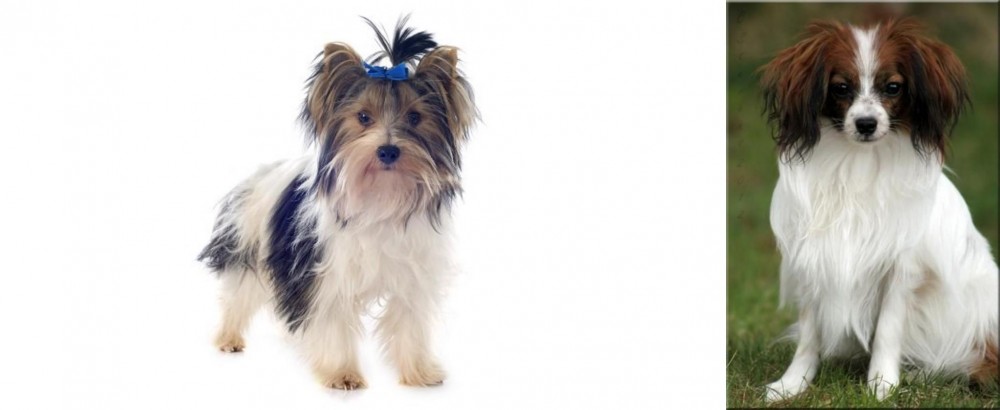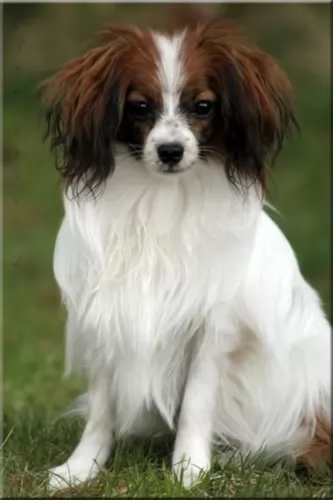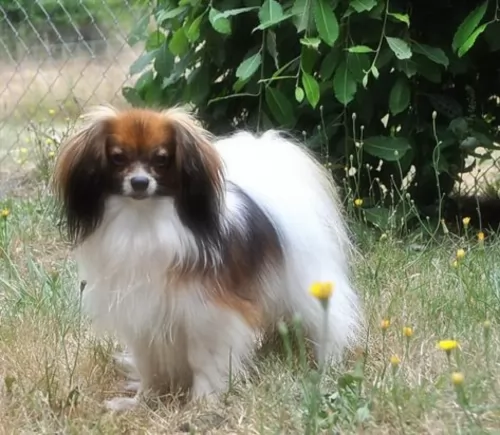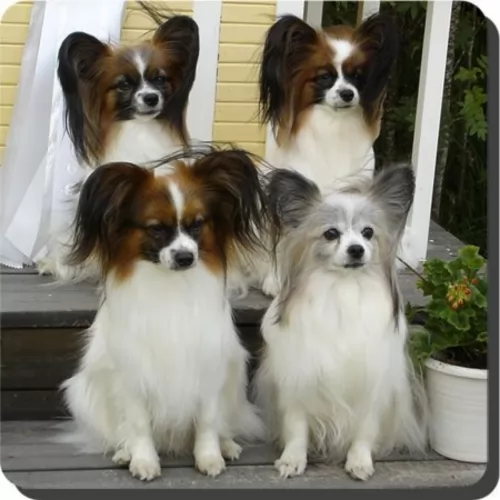 Petzlover
Petzlover Biewer is originated from Germany but Phalene is originated from France. Biewer may grow 6 cm / 2 inches shorter than Phalene. Both Biewer and Phalene are having almost same weight. Both Biewer and Phalene has same life span. Both Biewer and Phalene has almost same litter size. Biewer requires High Maintenance. But Phalene requires Moderate Maintenance
Biewer is originated from Germany but Phalene is originated from France. Biewer may grow 6 cm / 2 inches shorter than Phalene. Both Biewer and Phalene are having almost same weight. Both Biewer and Phalene has same life span. Both Biewer and Phalene has almost same litter size. Biewer requires High Maintenance. But Phalene requires Moderate Maintenance
 The Biewer is, or was, a piebald Yorkie caused by a recessive gene in a breeding of two Yorkshire Terriers. On Jan 20, 1984 a piebald Yorkshire puppy was born in Hunsruck, Germany to Gertrud and Werner Biewer. The puppy was considered beautiful and the Biewer’s fell in love with it and began a process od selective breeding in an effort to breed piebald Yorkies. Based on a friend’s suggestion, they named this group of puppies, “Biewer Yorkshire Terrier a la Pom Pon”. By 1989 the Allgemeiner Club der Hundefreunde Deurschland (ACH) officially recognized the Biewer Yorkie as a separate breed. Today they are recognized world wide as two separate breeds.
The Biewer is, or was, a piebald Yorkie caused by a recessive gene in a breeding of two Yorkshire Terriers. On Jan 20, 1984 a piebald Yorkshire puppy was born in Hunsruck, Germany to Gertrud and Werner Biewer. The puppy was considered beautiful and the Biewer’s fell in love with it and began a process od selective breeding in an effort to breed piebald Yorkies. Based on a friend’s suggestion, they named this group of puppies, “Biewer Yorkshire Terrier a la Pom Pon”. By 1989 the Allgemeiner Club der Hundefreunde Deurschland (ACH) officially recognized the Biewer Yorkie as a separate breed. Today they are recognized world wide as two separate breeds.
Today there have been genetic studies done that have declared the Biewer Terrier to be a separate and distinct breed from the Yorkshire Terrier, not simply tricolored Yorkies. The BTCA (Biewer Terrier Club of America) changed the name and standard to an original one for the Biewer Terrier. Mrs. Biewer has accepted and signed this revised standard and it is the only one she has accepted. This new standard allows the Biewer Terrier to have a black coat and an undocked tail. In 2014 with the new standard the American Kennel Club Foundation Stock Service (ACK/FSS) accepted the Biewer Terrier. Some breeders still want the breed called the Biewer Yorkshire a la Pom Pon, but Mrs. Biewer has objected to this, insisting the dog is a terrier. The Biewer Breed Club of America (BBCA) insists on the breeding of Biewers only to other Biewers. This is opposed by others who are importing Biewers and breeding them with Yorkies. The result is not recognized as a purebred dog. BBCA breeders do not engage in this type of cross breeding or condone them. The BBCA breeds only dogs that meet the standard set by the BTCA.
The first two Biewers were imported to the States in 2003 by Donna Hall. They made history in 2003, when they were accepted by the IABCA (International All Breed Canine Association) and entered their first dog show. Today they are shown in rare breed dog shows around the world. Today there are two standards in operation for the Biewer as the American Biewer and the North American Kennel Club continue to follow the German standard while the BBCA follow the revised standard approved by Mrs. Biewer.
 The Phalène is a toy breed, and in fact the Papillon and Phalène differ only by their ears, but are exactly the same in all other ways.
The Phalène is a toy breed, and in fact the Papillon and Phalène differ only by their ears, but are exactly the same in all other ways.
Thought to have developed in Western Europe, its exact origin isn’t clear but it is an ancient breed, as paintings seem to indicate that it has been around since the 16th century.
It is essentially a companion dog today. The dog is classified as a variety of the Papillon by the AKC, with the FCI classifying it as a separate breed.
 This long-haired terrier is a neat and compact toy dog. Their hair should be as long as their body is high and hang straight from the bottom of his skull to the end of his tail which is carried upward. He is a well proportioned and powerful little dog. He has no undercoat, but his overcoat is very much like human hair and should be combed. The head is a signature of the Biewer, covered with symmetrical gold, white and blue/black hair. They have flat, small heads and a black nose with an average muzzle. They have intelligent, dark, medium sized eyes and small ears shaped as a V and standing erect. All four legs are straight, and the hips are well formed. They have round feet and an undocked tail.
This long-haired terrier is a neat and compact toy dog. Their hair should be as long as their body is high and hang straight from the bottom of his skull to the end of his tail which is carried upward. He is a well proportioned and powerful little dog. He has no undercoat, but his overcoat is very much like human hair and should be combed. The head is a signature of the Biewer, covered with symmetrical gold, white and blue/black hair. They have flat, small heads and a black nose with an average muzzle. They have intelligent, dark, medium sized eyes and small ears shaped as a V and standing erect. All four legs are straight, and the hips are well formed. They have round feet and an undocked tail.
 This toy breed stands at between 20 – 28cm in height and weighs around 4 – 5kg. He has floppy, silky ears and is a Papillon dog, and a Papillon with dropped ears is known as a Phalène.
This toy breed stands at between 20 – 28cm in height and weighs around 4 – 5kg. He has floppy, silky ears and is a Papillon dog, and a Papillon with dropped ears is known as a Phalène.
The dome of the head is rounded and the Phalene has a slim muzzle with bright, alert brown eyes and a black nose. The tail is well plumed and is carried over the back. The coat isn’t a double coat like many other dogs, but it is lustrous, being straight, long and smooth. The coat is available in a number of coat colors, essentially being a blend of white, tan, black and orange or fawn.
The Phalène is an intelligent dog, and they will be able to learn quickly and easily when you teach them how to sit, lie down or stay. Training and socialization is always excellent for dogs, even small ones like this as it teaches them to be obedient and well mannered.
The Phalene is a sociable, friendly dog but is inclined to be reserved around strangers. Phalènes are essentially lap dogs and they make great companions for all kinds of people as well as being great playmates for disciplined, kind children. Because he is small and calm, he makes a great pet for country- or city dwellers.
 The Biewer Terrier loves to be loved and he returns it in volumes. This is a dedicated, fun loving and charming little dog that you can carry around. They are loyal and friendly, athletic and alert. They are barkers when they need to be, but they are not “yappy dogs”. They love toys so make sure they have plenty. They will carry them wherever they go.
The Biewer Terrier loves to be loved and he returns it in volumes. This is a dedicated, fun loving and charming little dog that you can carry around. They are loyal and friendly, athletic and alert. They are barkers when they need to be, but they are not “yappy dogs”. They love toys so make sure they have plenty. They will carry them wherever they go.
 The Phalene is such a sweet little dog, and you can definitely count him as as ‘man’s best friend’. He just loves to be wherever his human family is, lapping up their attention indoors but also loving being with them outdoors. When well trained and socialized, these dogs make splendid playmates for children too.
The Phalene is such a sweet little dog, and you can definitely count him as as ‘man’s best friend’. He just loves to be wherever his human family is, lapping up their attention indoors but also loving being with them outdoors. When well trained and socialized, these dogs make splendid playmates for children too.
Small though he is, he makes a good watch dog too and he will bark to warn his human family of danger. Give him the love and care he so rightly deserves, and he promises to make you a splendid pet and companion.
 The Biewer Terrier is not a cross breed or hybrid and so does have some of the very serious health issues of the Yorkshire Terrier including the bane of small dogs with liver shunts. Liver shunts are fatal if they are not treated. The breed does have sensitive stomach issues as well. They face other small dog issues like floating patella’s, ear and skin infections. Other than this the Biewer Terrier is a very healthy breed.
The Biewer Terrier is not a cross breed or hybrid and so does have some of the very serious health issues of the Yorkshire Terrier including the bane of small dogs with liver shunts. Liver shunts are fatal if they are not treated. The breed does have sensitive stomach issues as well. They face other small dog issues like floating patella’s, ear and skin infections. Other than this the Biewer Terrier is a very healthy breed.
 Your jaunty little Phalene can live to be up to 12 or 15 years of age if well cared for. Even so, there are always some of the more common dog illnesses worth knowing about, and we look at a few -
Your jaunty little Phalene can live to be up to 12 or 15 years of age if well cared for. Even so, there are always some of the more common dog illnesses worth knowing about, and we look at a few -
Any dog can get epilepsy – when your pet suddenly has a seizure or fit for no apparent reason. It can be disturbing to see, but with medication your pet can live a normal life.
Always keep a check on your pet’s eyes because there are a few eye diseases that can affect your pet and these are cataracts, progressive retina atrophy and entropion. Thankfully a veterinary ophthalmologist can help with the best treatment.
 As previously mentioned the Biewer Terrier has a very sensitive stomach and intestinal system. He should be fed low protein dry dog food. Watch for signs of food allergies such as scratching or chewing on his feet. Feed 2-3 times a day but the Biewer Terrier is one of the few dogs that you can safely free feed unless you notice substantial gaining of weight.
As previously mentioned the Biewer Terrier has a very sensitive stomach and intestinal system. He should be fed low protein dry dog food. Watch for signs of food allergies such as scratching or chewing on his feet. Feed 2-3 times a day but the Biewer Terrier is one of the few dogs that you can safely free feed unless you notice substantial gaining of weight.
Health issues are few as mentioned previously. However, make sure your Briewer’s ears are free of debris and wax, make sure their teeth are brushed and they show no signs of allergies. Along with liver shunts, sensitive intestinal and stomach issues and floating patellas, these are the other minor issues that might occur. Watch for diarrhea and off colored stools.
The Biewer Terrier is an active dog that needs regular exercise and walks. He is a speed demon as his ancestor the Yorkie is and needs an outlet for running as well as daily walks. They love to run, and they love to play. They do great in agility but love adventures. They are smart and love to learn tricks. Since they love hunting vermin they would also excel at Barn Hunt.
 These are energetic little dogs and will require getting a regular dose of exercise. He loves a walk and being allowed off his leash for a good run. He also loves ball games. Exercise is important for small dogs like this to ward off obesity.
These are energetic little dogs and will require getting a regular dose of exercise. He loves a walk and being allowed off his leash for a good run. He also loves ball games. Exercise is important for small dogs like this to ward off obesity.
These little dogs will need to have their ears checked and cleaned if you want to avoid ear infections. If you’re not sure how to clean the inside of the ears, rather leave it to an expert who can show you how its done. Small dogs always need to have their teeth checked regularly. He will also need to have his nails trimmed.
To maintain the long, silky coat, brush your dog at least twice a week. Some Phalene dog owners take their pet to the vet to have the coat professionally groomed and trimmed.